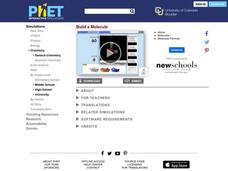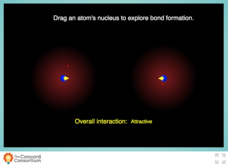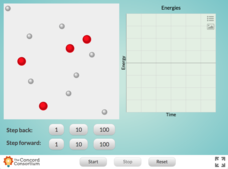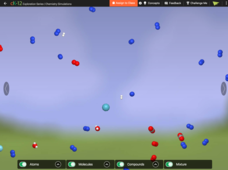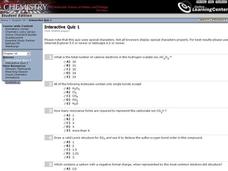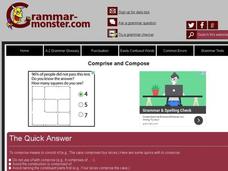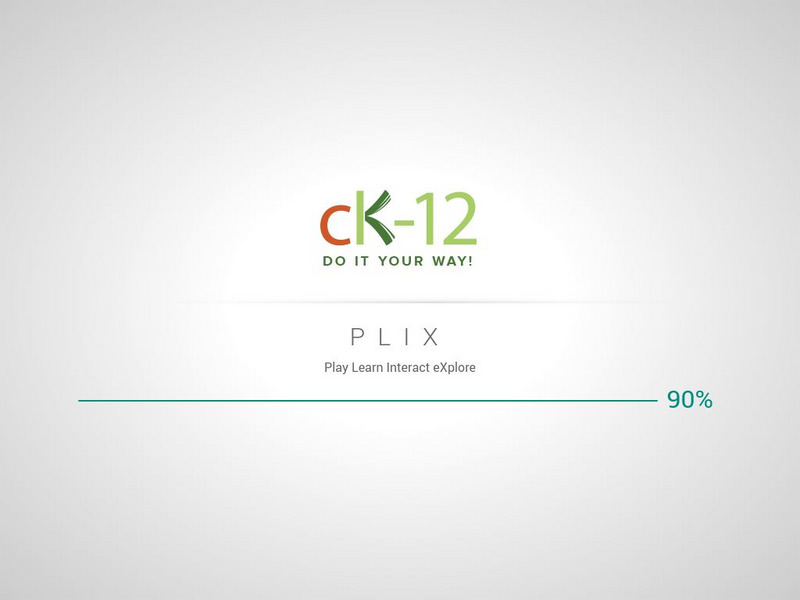PhET
Build a Molecule
How many different molecules can you build? In a simulation, learners make molecules from given atoms. There are numerous collections from which to build three to five molecules from given kits of atoms. Scholars can also view their...
PhET
Molecule Shapes: Basics
In molecules, bonds rotate about the nucleus due to the repulsion of subatomic particles. In a simulation, learners manipulate the bonds of a molecule to meet the atoms' needs. They can then see the specific molecular shapes of five...
PhET
Molecule Shapes
The shape of a molecule is determined by the arrangement of atoms around the central atom and lone pairs of electrons. Scholars build models of molecules using single, double, and triple bonds. They can then see real molecules bond...
Concord Consortium
Forming a Molecule
What does it look like when two atoms bond? Mol-e-COOL! Aspiring chemists observe the interaction between two atoms forming a bond in an easy-to-use interactive. Individuals move atoms closer together and observe changes in attraction...
Concord Consortium
Reaction Between Hydrogen and Oxygen Atoms
Is this resource a great way for your class to observe bonding between oxygen and hydrogen? OH yeah! Scholars learn about the changes in kinetic and potential energy as molecules of oxygen and hydrogen interact. Kinetic, potential, and...
Concord Consortium
Making Molecules
It's molecule magic! Skillful scholars explore the effects of different atoms on molecular polarization using an intuitive interactive. The resource displays the charge at different locations on the molecule, then adapts as the user...
Concord Consortium
Making and Breaking Bonds: The Effect of Temperature
Time to turn the heat up on your next bonding lesson! Young chemists explore temperature, kinetic energy, and bonding through an interesting interactive. The controls allow individuals to vary the temperature, as well as pause progress...
Concord Consortium
Oil and Water
If you don't get along with someone, it's said that the two of you are like oil and water. Why is this? Explore the phenomenon and explain the phrase in one resource! Science superstars first observe samples of oil and water together....
Concord Consortium
Energy of Bond Formation
Show your chemistry class that there's much more to covalent bonding than sharing electrons! Pupils manipulate atoms of hydrogen, oxygen, and carbon to observe the energy of bond formation using a well-rounded interactive. The resource...
CK-12 Foundation
Air Matters
What makes up the air we breathe? Young scientists explore the atoms and molecules in the air. An interactive lesson allows individuals to watch the movement of the particles in the air and change the makeup from a mixture to a...
Curated OER
Ten Multiple-Choice Rate, Ratio, and Proportion Problems
In this rate, ratio, and proportion worksheet, 7th graders solve ten multiple-choice problems. The solutions are provided by clicking on the "show answers" on the bottom of the page.
Curated OER
Chemistry and Bonding
In this bonding worksheet, students take an interactive quiz with 15 multiple choice questions about the VSEPR Theory, bonding, the geometry of molecules, Lewis structures, resonance structures and enthalpy changes.
Curated OER
Comprise/Compose
In this comprise and compose worksheet, students choose the correct word to complete each sentence. Students choose either comprise or compose to complete 9 sentences.
Concord Consortium
Concord Consortium: Stem Resources: Spectroscopy
Web-based activity walks learners through the use of spectroscopy in determining the identity of atoms and molecules by defining the excited state of atoms, the frequencies of emitted photons, and atoms' ability to absorb them....
CK-12 Foundation
Ck 12: Plix: Aspartame Molecule: Peptides
[Free Registration/Login Required] Given prior knowledge of bonding and the molecular make up of aspartame, examine the model and determine which color represents which atom. Drag the labels at the bottom to the appropriate colored atom...
CK-12 Foundation
Ck 12: Plix: Carbohydrates: A Glucose Molecule
[Free Registration/Login Required] Drag the groups of hydroxy and hydrogen atoms to their proper locations to make a complete glucose molecule.
Other
University of Kansas: Quarked!: Matter Mechanic
Build elements and molecules using neutrons, protons, and electrons. Choices include helium, carbon, oxygen, aluminum, water, and salt.
University of Colorado
University of Colorado: Ph Et Interactive Simulations: Reactions & Rates
Explore what makes a reaction happen by colliding atoms and molecules. Design experiments with different reactions, concentrations, and temperatures. When are reactions reversible? What affects the rate of a reaction?
Concord Consortium
Concord Consortium: Stem Resources: Chemical Bonds
By working through this web-based activity, students differentiate between ionic, non-polar covalent, and polar covalent bonds. Specifically, distinctions are made between bonding types based on orbital shapes and electronegativity...
